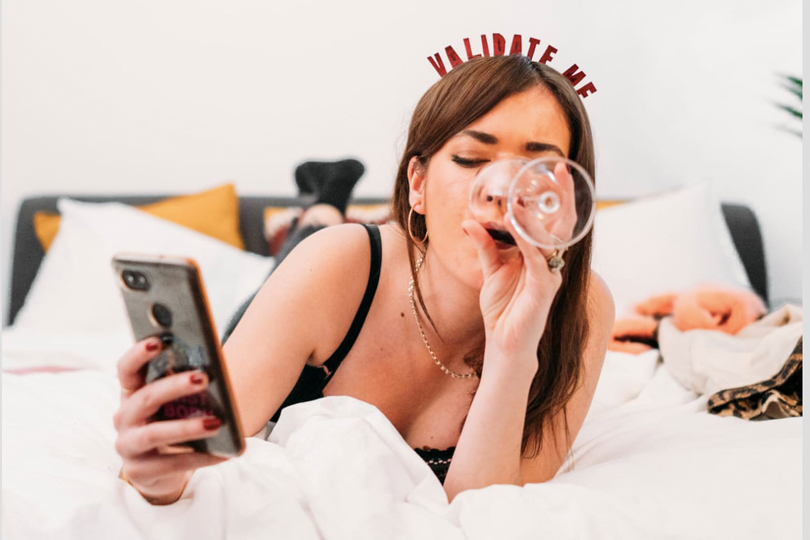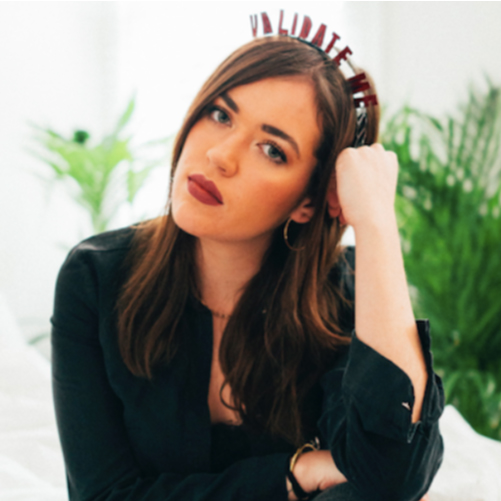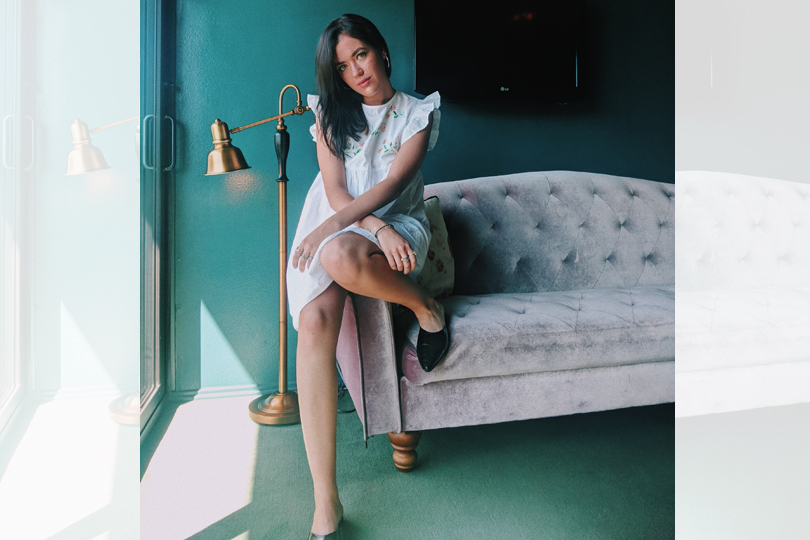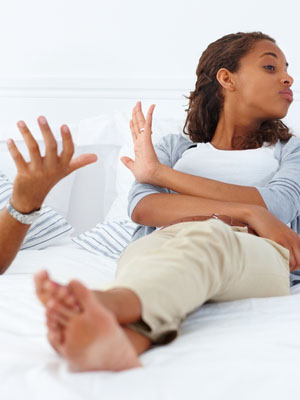Charly Cox is a 24-year-old London-based poet and survivor of digital burn-out. After realizing she was completely consumed by her phone and was having a breakdown because her brain was internalizing her life in tweets, she knew she needed to take a step back. Her new book, Validate Me!, is the product of writing through this experience. In it, she meditates on the highs and lows of digital life. Her first book was an instant bestseller, and Charly was hailed by Elle Magazine as one of 20 power players to watch out for.
Here, we chat about her career path, her new book, why she hates the term “Instagram poet,” and her advocacy work that aims to destigmatize mental health.
Walk us through your education and career path. Did you always want to be a writer? How did you get to where you are today?
I left school at 16 years old, after a debilitating bout of anxiety and depression, giving up my dream of reading English at Oxford. I started working at Burberry as a studio assistant and later stylist (I’d emailed the studio manager explaining that whilst I had no experience my mum had given me two weeks to find a job or I had to go back to college… I ended up staying there for a year.) Having fallen in love with a model and knowing he lived in Chelsea, on my day off I went and sat in a cafe reading Oscar Wilde, hoping he’d spot me and fall in love with me too (I am still that girl, no shame), but instead, walked away from the afternoon armed with streetstyle photos and the plan to start a blog. I did. It did well. I left Burberry—without the model. I then moved onto working as a digital producer and advised and produced for the likes of Russell Brand, The UN, Caspar Lee, JacksGap and CNN. After five years of coding everyone else’s projects, I decided to start my own. I had always wanted to be a writer—or, I always was a writer, I just wasn’t publishing my work. A friend had suggested that I challenge myself to write a poem a day and make a short film of each one to put online to see if anyone liked them. 6 months later I got a book deal. The rest is new history.
Congrats on your new book, Validate Me! What is it all about, and what inspired you to write it?
Thank you! At the beginning of this year I could feel digital burn-out creeping in. After the success of She Must Be Mad I was suddenly all consumed by my phone, social media, learning to deal with trolls and bad reviews. My internal rhetoric was shot to pieces. So I tried to write through it. Validate Me is the outcome. I went to LA, got my heartbroken, hit a bipolar high and then had a breakdown. Validate Me both pulled me through it all. It’s messy and imperfect and sometimes probably a bit trivial, but I don’t think I could sum up this last year in any other way. It’s a book for those looking to find some solace in their pain. It won’t make you feel any better—it’s not a self help guide—but knowing someone else is going through it too? I hope that makes someone feel a little less lonely.
So, you wrote the whole book on your phone? What was that like? Is that your usual process?
>Ha, the irony, right? There’s something about writing things on your phone that makes the process feel less formal, less terrifying. I find prescriptive writing quite anxiety inducing, but writing on my phone, hammering it out as though it’s a text or a WhatsApp or a draft, that’s where I can get out all my feelings in their brutal harshness. Everything tends to start as a note on my phone, then I’ll write it out in a notebook, or send it to my editor at 4:00 am before I can wake up and decide it’s shit and delete it.
You wrote in the introduction that you were on the cusp of digital burnout when you pitched this collection. How would you describe this feeling? Do you have any advice for preventing digital burnout?
We are so good at blaming technology when we are the ones who have allowed it to have the power it has. I mean, I essentially wrote a book about how much I hate my phone, but it was coming to terms with the seriousness of it, (there is nothing quite as sobering as sobbing at a psychiatric doctor in the emergency room at 5:00 am, being told you’re having a breakdown, and realising that it’s because your brain is internalising your life in tweets…) to make you step away and think: I’ve allowed this to happen. I am in control of this.
If you’re getting to the point where you think you have a problem, turn your phone off. Delete the apps that make you sad. Unfollow the accounts that make you feel self loathing. It’s boring to hear—obvious too—but a bit like the advice your mother would give, you should listen to it, even if you think you’re bigger and better than it. You’re not.

You talk about being code-dependent. What are some of the struggles you’ve faced in terms of seeking validation online?
I starved myself. I shaved my face. I had a breakdown. But I wrote a book about it, which is currently available for you to buy and read in more detail.
There has been a lot of talk about how a new generation of young female Instagram poets are changing the rules of the genre. What are your thoughts on this?
I loathe the term Instagram poet. It’s lazy. I have published more poems in books than I have on Instagram. I post more pictures of myself in pretty dresses on Instagram than I do poems. You wouldn’t call Tennyson a book poet.
What I am here for is young people finding worth, solace, and meaning in poetry. It’s breaking down an elitist barrier around poetry as an art form again, which is brilliant. Young people finding community and expression in words—brilliant, brilliant, world-changing, life-saving stuff. It’s all too brilliant and all too important to box it in the way it currently is.
You’ve discussed the dangers of social media, in terms of feuling comparison, and yet you use Instagram as a platform to share your poetry. How do you navigate the ups and downs of social media?
The fuelling of comparison and me sharing my poetry on there are too very different things.
I post my work there for it to be seen and in the hope that it might help someone who’s struggling to articulate how they’re feeling. If I’m finding myself in a pit of comparison with an account, I unfollow it. If I realise I’ve spent most of my day staring at my screen, I study what it is I’m trying to avoid.

One of the important themes your work discusses that is so relatable for people is mental health, and you’re also an ambassador for MQ Mental Health. What are some tangible ways we can work towards continuing to destigmatize mental health?
Be open and honest in your daily conversations. It’s not about hashtags and designated days, it’s about the conversations you have in real life. It’s about the way you check in on friends if they’ve been quiet. It’s about changing the language you use. It’s about being kinder to strangers.
What role has social media and poetry played in your own mental health journey?
The way I use social media has contributed terribly. Poetry, both writing and reading it, saved my life.
What message do you hope that your book leaves readers with?
– To take ownership of your online use.
– To search for the funny side.
– To not go to parties in Denmark Hill.
– To not believe the guy in LA is only texting you. He probably has a girlfriend.
Who do you look up to as a role model?
My friend Louise. She’s strong as hell.
What are you reading this fall?
The Blues Comes With The Good News by Sonny Hall and It’s Okay To Be Blue by Scarlett Curtis.
What’s next for you?
A long nap. I’m working on two new projects at the moment that I have to be annoyingly aloof about. But mostly, trying to work out how to look after myself as best I can while navigating this bizarre industry.












